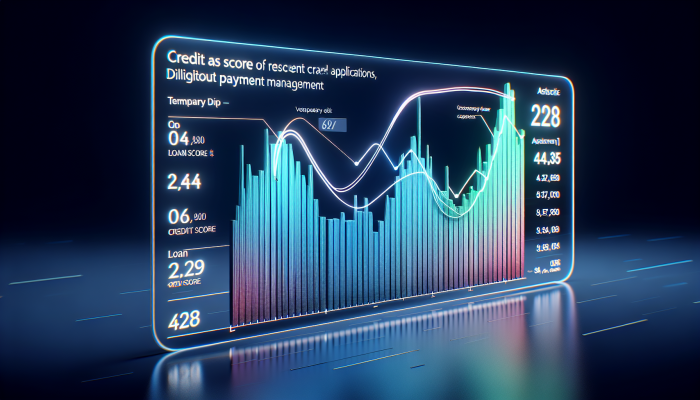Unlock the Secrets of Debt Consolidation and Its Power to Enhance Your Credit Score
Engaging in debt consolidation is a transformative financial strategy that can significantly improve your overall financial health and stability. Understanding how debt consolidation impacts your credit score is vital for making knowledgeable decisions that pave the way for a more secure financial future. By delving into the complexities of your credit score and the mechanics of consolidation, you can confidently steer your financial journey with informed insights. This understanding empowers you to take actions that not only resolve your current debt challenges but also lay the groundwork for enduring financial success and resilience.
Evaluate the Immediate Impacts of Debt Consolidation on Your Credit Score

As you begin your debt consolidation endeavor, you may notice a temporary decline in your credit score. This initial dip often stems from hard inquiries made when you apply for new credit accounts, such as a personal loan or a balance transfer credit card. Lenders conduct these inquiries to evaluate your creditworthiness, and each inquiry can cause a slight reduction in your score. Although this decrease may be disheartening, it typically represents a short-term setback rather than a permanent issue.
The initial drop in your credit score can be particularly stressful, especially if you're already facing financial challenges. However, you can effectively mitigate this early decline by responsibly managing your consolidated debt and ensuring timely payments. As you consistently meet your obligations on the new loan or credit card, the impact of the hard inquiry will diminish, leading to an improvement in your score. This phase calls for patience and a dedicated commitment to your financial objectives.
Maximize the Long-Term Benefits of Debt Consolidation to Improve Credit Utilization
A key long-term advantage of debt consolidation is its capacity to lower your credit utilization ratio. This crucial metric assesses the relationship between your total credit card balances and your available credit, playing an essential role in determining your credit score. A reduced credit utilization ratio sends a positive signal to lenders regarding your responsible credit management, which can significantly enhance your credit profile over time.
When you consolidate your debt, particularly by paying off high-interest credit cards, you can make a noticeable reduction in your outstanding balances. This decrease results in a healthier credit utilization ratio, ideally keeping it below 30%. By maintaining a low utilization rate, you not only bolster your credit score but also establish yourself as a lower-risk borrower in the eyes of financial institutions.
However, it is critical to sustain this low utilization level after consolidation. If you begin to accrue new debt on your credit cards following consolidation, you risk undermining the positive effects on your credit score. Therefore, adopting a disciplined approach to managing your credit post-consolidation is essential for achieving long-lasting success.
Recognizing the Vital Importance of Payment History for Debt Consolidation Success
Your payment history is the most significant factor influencing your credit score, accounting for around 35% of your FICO score. Therefore, utilizing debt consolidation to create a manageable payment plan can greatly enhance your credit profile. By consolidating your debts, you streamline your financial obligations into a single monthly payment, making it simpler to stay organized and maintain control of your finances.
Making consistent on-time payments after consolidation will positively impact your credit score. Each timely payment contributes a favorable entry to your payment history, helping to counteract any initial adverse effects from hard inquiries. The longer you uphold a solid payment history, the more significant its influence becomes in shaping your overall credit score.
While this process may require dedication and persistence, the ultimate reward is a healthier credit score and an improved financial standing. Therefore, it is beneficial to view debt consolidation as a strategic tool rather than a mere temporary fix, as it can produce remarkable long-term benefits.
Exploring Diverse Debt Consolidation Strategies and Their Influence on Credit Scores

Gaining an in-depth understanding of the various debt consolidation methods is crucial, as each option comes with specific implications for your credit score. By examining these choices, you can make informed decisions that align with your financial goals and individual circumstances.
Leveraging Personal Loans for Effective Debt Consolidation Solutions
Personal loans have become a popular option for debt consolidation, enabling you to combine multiple high-interest debts into a single loan with a fixed interest rate. This strategy can yield varying effects on your credit score. When you apply for a personal loan, it results in a hard inquiry, potentially causing a modest decrease in your score. However, as you begin to make regular payments, the positive influence on your credit score can be substantial.
Moreover, personal loans typically offer lower interest rates compared to credit cards, allowing you to save on interest payments while effectively reducing your total debt. As you pay down your consolidated debt, your credit utilization ratio improves, further enhancing your credit score.
It is essential, however, to avoid accumulating new debt while repaying your loan. This practice ensures that you maximize the benefits of debt consolidation while maintaining a healthy credit score.
Utilizing Balance Transfer Credit Cards for Effective Debt Management
Balance transfer credit cards offer an attractive solution for consolidating debt. These cards allow you to transfer high-interest credit card balances to a new card with a lower interest rate, often featuring an introductory 0% APR. This approach can significantly reduce your interest payments but entails specific credit score considerations.
When you apply for a balance transfer card, a hard inquiry is recorded, which can temporarily affect your credit score. However, if you manage to pay off your transferred balance during the promotional period, you can achieve substantial savings. Additionally, this method can lower your credit utilization ratio, positively impacting your score, provided you maintain low balances on your other credit cards.
Conversely, if you fail to pay off the balance before the promotional period expires, the interest rate may spike significantly, resulting in higher payments that could strain your finances. Furthermore, maxing out your new balance transfer card could negatively impact your credit utilization ratio, leading to an adverse effect on your score.
Using Home Equity Loans for Strategic Debt Consolidation

Home equity loans present another option for debt consolidation, allowing you to utilize the equity in your home as collateral to secure a loan. This option can provide lower interest rates, which is beneficial for managing high-interest debts, but it also carries unique risks and implications for your credit score.
While a home equity loan can help reduce your credit utilization ratio and improve your score, the risk of losing your home in the event of default is considerable. Similar to other consolidation methods, applying for a home equity loan will result in a hard inquiry, temporarily lowering your credit score.
It is crucial to assess your overall financial situation carefully before pursuing this option. If you are confident in your ability to manage the payments and avoid taking on additional debt, a home equity loan can serve as a valuable resource for consolidating debt while simultaneously enhancing your credit score.
Effective Strategies to Reduce the Negative Impact on Your Credit Score
Implementing the following strategies will help ensure that your debt consolidation experience enhances rather than detracts from your credit score. These practices will aid you in navigating the complexities of consolidation while protecting your financial health and future.
Choosing the Best Debt Consolidation Method to Suit Your Unique Needs
Selecting the most appropriate debt consolidation method is essential for minimizing adverse effects on your credit score. Take the time to thoroughly evaluate various methods, weighing their advantages and disadvantages in relation to your specific financial situation.
For instance, a personal loan may be a suitable choice if you have a stable income and a strong credit profile due to its generally lower interest rates. Conversely, a balance transfer credit card with a lower limit may be more beneficial if your credit is less than ideal.
Conduct comprehensive research on different lenders, scrutinizing the fine print, and ensuring that you fully understand the terms and conditions associated with each option. This diligence will empower you to select a method that aligns with your financial objectives while minimizing any negative impact on your credit score.
Maintaining a Low Credit Utilization Ratio After Consolidation
Once you have completed your debt consolidation, it is vital to sustain a low credit utilization ratio to safeguard your credit score. One effective strategy is to refrain from accumulating new debt on your credit cards while you are repaying your consolidated loan. This practice helps to keep your credit utilization low, positively influencing your credit score.
Additionally, consider utilizing budgeting tools to monitor your spending habits and ensure that you live within your financial means. By maintaining low credit card balances and making timely payments, you reinforce a positive credit history, which lenders highly value.
Another practical approach is to request credit limit increases on your existing credit cards. This can enhance your total available credit, thereby lowering your credit utilization ratio, provided that you avoid increasing your spending.
Building a Robust Payment History to Enhance Your Credit Score
A strong payment history is crucial for boosting your credit score following debt consolidation. Throughout the debt consolidation process, commit to making consistent, on-time payments. This dedication will not only elevate your credit score but also promote a sense of financial discipline and responsibility.
Consider setting up automatic payments for your consolidated loan or credit card to ensure you never miss a due date. Regularly monitoring your accounts can provide additional peace of mind, allowing you to address any potential issues before they escalate.
Remember, a positive payment history signals to lenders that you are a responsible borrower. Over time, this can lead to increased creditworthiness and the potential for more favorable loan terms.
Real-Life Scenarios: Examining the Impact of Debt Consolidation on Credit Scores
To gain a deeper understanding of the effects of debt consolidation on credit scores, let's explore real-world scenarios and case studies. These examples will illustrate how individuals have navigated the challenges of consolidation and the resulting impacts on their credit scores.
Case Study: Overcoming the Burden of High-Interest Credit Card Debt
Consider Jane, who was overwhelmed by substantial high-interest credit card debt. With several cards maxed out and monthly payments spiraling out of control, Jane decided to pursue a personal loan for debt consolidation.
Initially, Jane's credit score experienced a decline due to the hard inquiry from her loan application. However, as she diligently made timely payments on her new loan, her credit score began to recover. Within a year, her credit utilization ratio decreased significantly, leading to a noticeable improvement in her credit score.
Through disciplined financial management, Jane successfully transformed her financial situation, leveraging debt consolidation to regain control over her credit.
Case Study: Simplifying Student Loan Payments for Better Management
A recent graduate, Mark, faced the challenge of managing multiple student loans with differing interest rates. He chose student loan consolidation to simplify his payments and potentially lower his interest costs.
Initially, Mark experienced a slight dip in his credit score due to the hard inquiry associated with his consolidation efforts. However, his credit score gradually improved as he made consistent payments on the consolidated loan. Mark maintained a healthy credit utilization ratio by avoiding new debt, showcasing the positive impact of consolidation on his credit profile.
This case exemplifies how strategic debt consolidation can yield favorable outcomes for credit scores, particularly for young borrowers.
Case Study: Efficiently Managing Multiple Small Debts
Sarah had accumulated various small debts from personal loans and credit cards. She opted for a balance transfer credit card with an introductory 0% APR to consolidate these obligations.
While her credit score temporarily dropped due to the hard inquiry, Sarah successfully paid off her transferred balance before the promotional period ended. Consequently, her credit utilization ratio improved, and her credit score steadily increased.
Sarah’s experience highlights the importance of effectively managing consolidation methods and illustrates the significant potential for improved credit scores through disciplined financial behaviors.
Clarifying Common Misconceptions About Debt Consolidation and Credit Scores
As with any financial topic, numerous misconceptions surround debt consolidation and its effects on credit scores. Let’s clear up some of the most prevalent myths for a better understanding of this financial strategy.
Myth: Debt Consolidation Always Leads to a Lower Credit Score
A widespread belief is that debt consolidation automatically results in decreased credit scores. While it is true that hard inquiries can temporarily affect your score, debt consolidation can ultimately encourage long-term improvements. By focusing on responsible payment habits and reducing your credit utilization ratio, you can significantly enhance your credit profile.
Grasping this nuance is essential for making informed decisions regarding your debt management strategies.
Myth: All Debt Consolidation Methods Yield Similar Outcomes
Another common misconception is that every debt consolidation method produces the same results on your credit score. Different options—personal loans, balance transfers, and home equity loans—carry distinct implications for your credit profile.
Each method has its own benefits and drawbacks, making it essential to evaluate them based on your unique financial situation and goals. A customized approach to debt consolidation can maximize its advantages for your credit score.
Myth: Debt Consolidation Erases Your Debt History
Some individuals mistakenly believe that debt consolidation eliminates their debt history, providing a fresh start. In reality, consolidating your debts does not wipe out your previous payment history or existing balances; it simply combines them into a more manageable format.
Your credit report will still reflect your past debts, and responsible management of the consolidated debt is crucial for demonstrating your creditworthiness. Recognizing this fact can help you approach debt consolidation with realistic expectations.
Addressing Common Questions About Debt Consolidation and Its Effects on Credit Scores
How Long Will It Take for My Credit Score to Recover After Consolidation?
Your credit score typically takes several months to recover following debt consolidation. The recovery timeline varies based on your payment behaviors and overall credit utilization.
Can Debt Consolidation Enhance My Chances of Securing Better Loan Rates?
Absolutely, consolidating your debt can improve your credit score, making you a more attractive borrower. This enhancement may allow you to qualify for more favorable loan rates.
What Should I Do If My Credit Score Drops After Consolidation?
If you notice a decline in your credit score after consolidation, concentrate on making timely payments and maintaining low credit utilization. Over time, these actions can help rebuild your score.
Is Debt Consolidation Right for Everyone?
Debt consolidation may not be the most suitable strategy for everyone. It is vital to assess your financial situation, including your debts, income, and spending habits, before determining if this approach is appropriate for you.
Can I Consolidate Both Student Loans and Credit Card Debt at the Same Time?
While student loans and credit card debts can be consolidated, they typically require different methods. To optimize potential benefits, consider specific options tailored to each debt type.
Will Debt Consolidation Impact My Ability to Obtain New Credit?
Initially, debt consolidation may affect your ability to secure new credit due to hard inquiries. However, with responsible management of consolidated debt, your creditworthiness can improve over time.
Are There Fees Associated with Debt Consolidation?
Some debt consolidation methods may involve fees, such as balance transfer or loan origination fees. It’s crucial to be aware of these costs before proceeding with consolidation.
How Can I Identify a Trustworthy Debt Consolidation Service?
Research and compare various debt consolidation services, focusing on reviews and ratings from credible sources. Ensure the service is transparent about fees and offers a realistic plan for managing your debts.
Can I Consolidate Debts Without a Strong Credit Score?
While a strong credit score simplifies consolidation, options are available for those with less-than-ideal credit. Consider secured loans or collaborating with credit counselors to develop personalized strategies.
Can Debt Consolidation Serve as a Long-Term Solution?
Debt consolidation can be part of a long-term financial strategy, but it requires ongoing discipline and responsible financial management. Use it as a stepping stone toward achieving a healthier financial future.
Connect with Us on Facebook
This Article Was First Found On: https://www.debtconsolidationloans.co.uk
The Article Debt Consolidation’s Impact on Your Credit Score Was Found On https://limitsofstrategy.com
The Article Debt Consolidation Effects on Your Credit Rating First Appeared ON
: https://ad4sc.com

